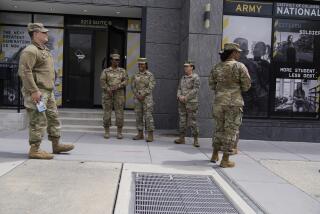Britain plans sweeping military cutbacks to close budget gap
- Share via
Reporting from London — Britain will reduce its fighting force by thousands of troops, scrap aging jet fighters, put off an upgrade of its nuclear deterrent and cut civilian defense jobs in a sweeping overhaul designed to make its military leaner and save taxpayer money, the government announced Tuesday.
Over the next four years, defense spending is to shrink by 8% in real terms, a reduction Prime Minister David Cameron said would be difficult but necessary to help Britain close a yawning public budget gap.
Cameron told lawmakers that the army, navy and air force would, together, shed 17,000 troops and that the defense department would cut 25,000 civilian jobs. The Ark Royal, the navy’s flagship aircraft carrier, is to be decommissioned earlier than expected, 40% of the army’s tanks will be taken out of action, and Britain’s fleet of highly praised but aging Harrier fighter jets is to be junked.
The prime minister insisted, however, that operations in Afghanistan would not be affected — he assured President Obama on that issue in a phone call Monday — and that what he termed nimbler, smarter armed forces would enable Britain to continue to project force where needed.
“Britain has traditionally punched above its weight in the world, and we should have no less ambition for our country in the decades to come,” Cameron told the House of Commons, the lower house of Parliament. “But we need to be more thoughtful, more strategic and more coordinated in the way we advance our interests and protect our national security.”
The announcement came a day before Britain’s Conservative-led government was set to unveil a public austerity plan that potentially is the toughest since World War II.
Cameron said that though the military is charged with safeguarding the nation, it could not be insulated from cost-cutting. But defense spending, budgeted at $58 billion this year, will be hit less hard than other parts of the government and will continue to meet the level mandated by membership in the North Atlantic Treaty Organization — 2% of gross domestic product.
“This is not simply a cost-saving exercise to get to grips with the biggest budget deficit in postwar history. It is about taking the right decisions to protect our national security in the years ahead,” Cameron told Parliament. “Our national security depends on our economic strength and vice versa.”
The cuts are part of Britain’s first strategic review of its armed forces since 1998, an overhaul that takes into account new threats and a changed landscape since the Sept. 11 terrorist attacks nine years ago.
As a result, not everything is losing out in the new defense spending plan. For example, even as troop strength is to shrink and some hardware is to be scrapped, the government will commit an extra $786 million to fortifying Britain’s cyber-defenses, a new front line in national security, Cameron said.
Still, the cuts announced Tuesday are likely to have some painful, as well as peculiar, effects.
Work is to continue on building two new state-of-the-art aircraft carriers, which were commissioned by the previous Labor Party government. But elimination of the Harrier jet fighters means that the aircraft carriers will carry no aircraft for nearly a decade, though they can be used for other purposes.
A decision on one of the most politically sensitive aspects of Britain’s defense program, the proposed upgrade of its sea-based nuclear deterrent, is to be put off until 2016, after the general election due in 2015. The Conservatives favor building new Trident nuclear submarines, but their junior partners in the coalition government, the Liberal Democrats, oppose the idea.
Ed Miliband, the leader of the opposition Labor Party, criticized the new spending plan as a rush job finished in weeks compared with previous defense reviews, which often took months to complete.
“This review is a profound missed opportunity,” Miliband said. “It has been chaotically conducted, it has been hastily prepared, and it is simply not credible as a strategic blueprint for our future defense needs.”
More to Read
Sign up for Essential California
The most important California stories and recommendations in your inbox every morning.
You may occasionally receive promotional content from the Los Angeles Times.











